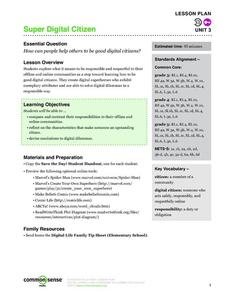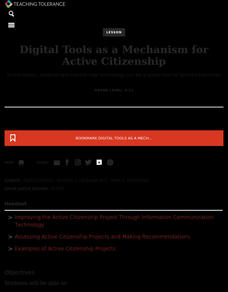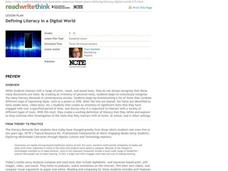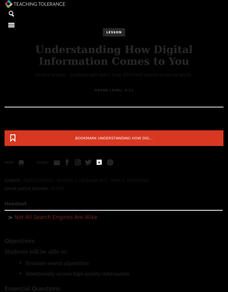Common Sense Media
Super Digital Citizen
Teach your charges how to become responsible digital citizens with superheroes! Start out with a brief class discussion about what acting safely, responsibly, and respectfully looks like. Next, have each pupil create their own digital...
Overcoming Obstacles
Good Citizenship
An individual's background and experiences affect their worldview and interaction. In this activity, scholars draw a pair of glasses with pictures of experiences they've been through, relate the responsibility to social media and the...
Curated Video
Policy - The Community Guidelines
Following a site's community guidelines is just one step toward being an excellent digital citizen. After a brief introductory video, small groups come up with their own community guidelines and present their ideas to come up with a...
Common Sense Media
Digital Citizenship Pledge
Learners collaborate to create a set of group norms and expectations by which they will abide in order to promote a safe, respectful online community.
Curated OER
Living in a Digital World
What does it mean to be a good digital citizen? Is it the same as face-to-face communication? In small groups, learners discuss the differences between digital and non digital life, how they are different and what each environment can...
Northwest Career & Technical Academy Foundation
Working Together Digitally
Now that your kids know everything about the world around them, it's time to get them familiar with the importance of connecting and communicating with other people using digital technology. They engage in two different activities that...
Teaching Tolerance
Digital Tools as a Mechanism for Active Citizenship
How is technology a useful tool for active citizenship? Pupils assume the role of technology consultants reviewing citizenship projects. Small groups collaborate to make recommendations about how to incorporate technology to improve...
Teaching Tolerance
Participating in Digital Communities
It's possible to promote inclusion and empathy on the Internet—it just takes effort! Scholars read and discuss a short story about being a friend online. Then, pupils role-play appropriate ways to respond to hate within a digital...
Teaching Tolerance
Constructively Engaging in Digital Communities
Say no to hate speech! Pupils discover the importance of practicing empathy and inclusivity in digital communities and discuss strategies for responding to online hate speech. Then, small groups develop and present class guidelines for...
ReadWriteThink
Defining Literacy in a Digital World
What skills are necessary to interact with different types of text? Twenty-first century learners live in a digital world and must develop a whole new set of skills to develop media literacy. Class members engage in a series of...
Curated OER
Citizens of the Future
Young sociologists explore how local, state, and federal governments work. This very impressive and ambitious lesson requires pupils to contact government officials who represent them and their families. They research elections, and hold...
Curated Video
Online Reputation and Cyber-bullying
Combat cyberbullying with information. During this plan, learners watch a couple of videos, consider online behavior scenarios, brainstorm long- and short-term consequences, and discuss how to react to bullying in order to build up to...
Curated Video
Privacy Part 2
Why is online privacy so important? Explore privacy with a group assignment for which pupils create word clouds with words they associate with privacy. A discussion and online activity follow. Learners will read articles, explore the...
Curated Video
Detecting Lies & Harmful Links
Who and what can you trust online? How do you know? After viewing a pair of introductory videos on positive and safe online conduct, learners discuss the content and put it into practice during an online search activity about alien life.
Curated Video
What Makes YouTube Unique
Start off a unit on YouTube with an introduction to the service and all that it offers. Learners watch various video clips before participating in a brief discussion about YouTube. The plan includes an activity based around information...
Curated Video
Reporting - Safety and Abuse Tool
Keep your charges safe online with instruction on how to report problems on YouTube. After providing learners with information on the Safety and Abuse Tool, demonstrate how to use the tool and discuss the feature. In groups, learners...
Curated Video
Reporting - Flagging
While it may feel like you can post just about anything on YouTube, that's not the case. Teach your class about flagging inappropriate content. Learners watch a demonstration, practice flagging, and answer questions about online content.
Curated OER
Digital Values: Internet Safety
Students explore digital communication by participating in a critical thinking activity. For this Internet safety lesson, students discuss ways to protect their identity on the Internet as well as preserving friendships. Students...
Common Sense Media
My Online Code
Approach ethical online behavior with a series of activities geared toward teaching pupils about digital citizenship. After a brief discussion about ethics, small groups inspect a fictional social networking profile with ethics in mind....
Anti-Defamation League
Building a Foundation for Safe and Kind Online Communication
Put a spotlight on internet safety with a lesson designed to boost positive online communication. Scholars listen to the story, Yettele's Feathers by Joan Rothenberg, and answer questions. An emoji-themed handout challenges pupils to...
Facing History and Ourselves
Citizen Watchdogs and the News
To conclude their case study of media coverage of the shooting of Michael Brown by a Ferguson, Missouri, police officer, class members consider the role of citizen watchdogs in a democratic society, develop strategies for combating...
Curated OER
What is a Computer Crime?
An important lesson on cybercrimes is here for you. In it, young computer users learn about how people commit crimes on computers by hacking into accounts, and stealing personal information from people. Some excellent discussion...
Teaching Tolerance
Understanding How Digital Information Comes to You
Google, Yahoo!, Bing ... so many choices, so little time! Using the resource, scholars explore how different search engines affect the way they find information. After reading a handout on the topic and engaging in small group...
Teaching Tolerance
Civic Engagement and Communication as Digital Community Members
Don't feed the Internet trolls! Using a thought-provoking resource, pupils brainstorm a whole-class list of the possible kinds of bias young people may experience online. Next, in small groups, scholars create posters illustrating how to...


